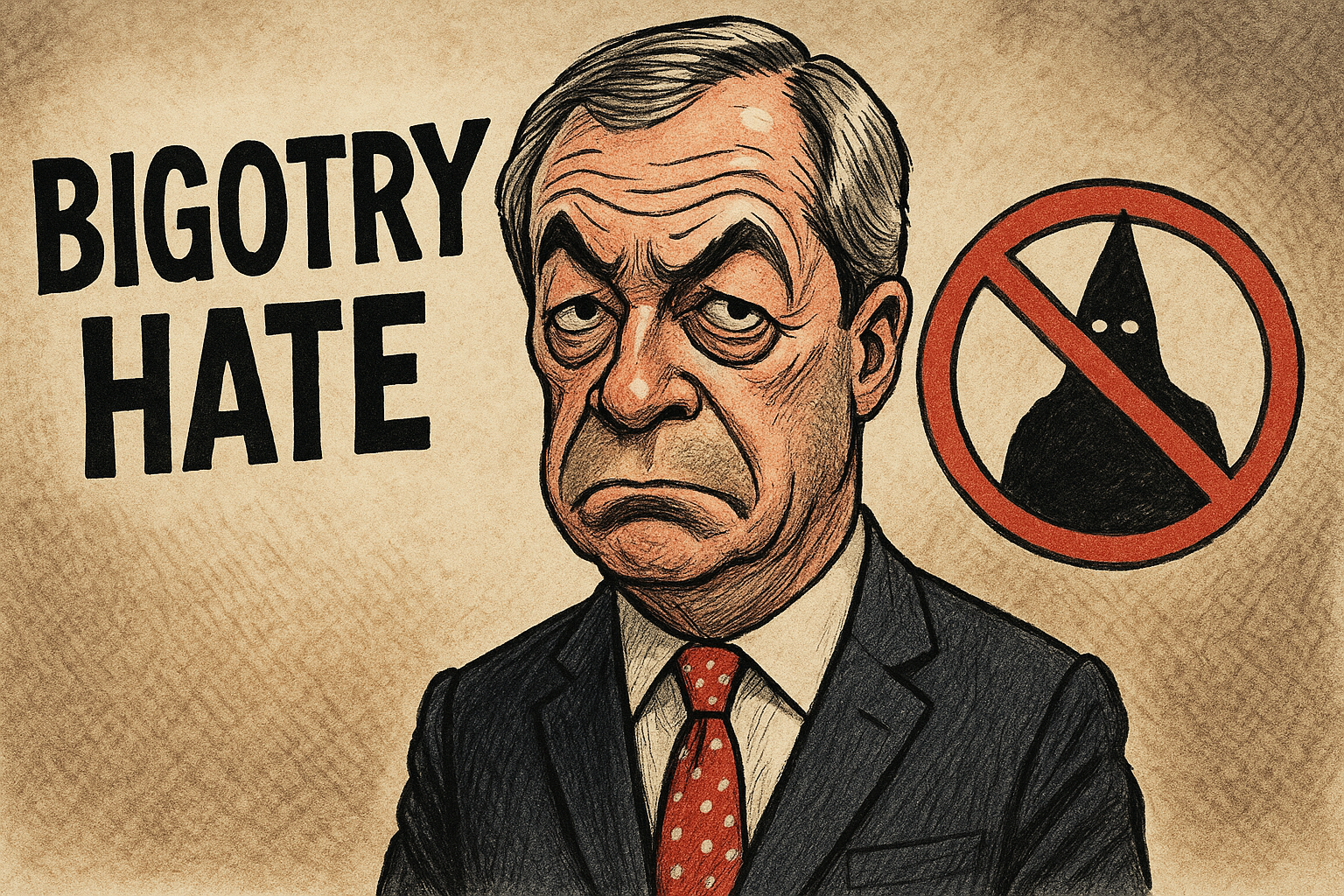
Nigel Farage Racism Record: 6 Verified Incidents That Expose the Truth
The Nigel Farage racism record is not a string of accidental gaffes — it’s a consistent pattern of inflammatory rhetoric, race-based fearmongering, and scapegoating. From anti-migrant billboards to Islamophobic commentary, Farage has repeatedly exploited racial tension to grow his brand and his political power.
Below are six verified examples that define Farage’s legacy of division, drawing from public interviews, campaign material, and media coverage.
1. The “Breaking Point” Poster: Fear as a Campaign Strategy
In June 2016, Farage revealed a billboard showing Middle Eastern refugees walking in line with the words: “Breaking Point — the EU has failed us all.”
→ New Yorker
→ Wikipedia
The backlash was immediate. Amnesty International compared the image to 1930s Nazi propaganda. Labour MP David Lammy called it “vile racism.” Even Conservative MPs condemned it. Despite the outrage, Farage refused to apologise. He claimed it was factual, not inflammatory.
This episode wasn’t just offensive — it was strategic. Farage didn’t misspeak; he carefully engineered a visual narrative to provoke fear, exploiting the refugee crisis for political gain.
Internal link: Main Controversies
2. Romanians and Racial Profiling
In May 2014, Farage said in an LBC radio interview that people would be “right to be concerned” if Romanians moved into their neighbourhood. When asked why, he said: “You know the difference.”
The implication was clear: he was linking nationality to criminality. Critics across parties labelled the remark racist. Farage later described the moment as “awkward” but refused to retract the sentiment. The narrative that Eastern Europeans are a danger became a familiar one in his speeches and media appearances.
3. Demonising British Muslims
Farage has consistently framed Muslims as incompatible with British values. He’s claimed that some Muslim areas in the UK live under Sharia law and described Muslim communities as a potential “fifth column” within the country.
→ The Guardian
→ The Independent
These remarks have been criticised by Muslim advocacy groups, politicians, and interfaith leaders. Critics argue Farage repeatedly fuels Islamophobic sentiments, often implying British Muslims are less loyal or more dangerous than other citizens.
Internal link: Biography & Background
4. Attacking Migrants with HIV
In 2015, Farage said migrants with HIV should be banned from accessing the NHS. He argued that “health tourism” was straining public services and that Britain couldn’t afford to care for people with infectious diseases coming from abroad.
Health charities and professionals across the UK condemned the statement as irresponsible and stigmatising. Farage’s rhetoric on health echoed similar strategies used by far-right leaders globally — using illness and fear of contagion to justify cruelty.
5. Normalising Racism in Political Debate
One of the most concerning impacts of the Nigel Farage racism record is how he has helped shift the political conversation. Views that were once condemned are now dismissed as “telling it like it is.” His media appearances often reframe bigoted statements as reasonable concerns, muddying the line between honesty and hate speech.
This normalisation has emboldened far-right groups and introduced race-baiting language into mainstream platforms. Farage’s influence has changed not only what is said, but what is considered acceptable in public life.
6. A Pattern, Not an Error
Some still argue that Farage’s worst moments are taken out of context. But these six incidents — along with countless lesser-known remarks — paint a clear picture. His use of race, religion, and nationality to divide and mobilise is not accidental. It is deliberate.
Whether at a rally, on GB News, or during a campaign speech, Farage repeatedly returns to themes of “us versus them.” He frames immigrants as threats, Muslims as disloyal, and multiculturalism as a failure.
The Nigel Farage racism record is not a bug in his politics — it is the core feature.
Final Thoughts
Farage built his popularity by breaking political taboos and playing on public fears. He has never needed to offer real solutions. Instead, he creates enemies: refugees, Romanians, Muslims, migrants with HIV. This strategy is powerful, dangerous, and deeply damaging to social cohesion.
His legacy is not just in policies or parties. It’s in the tone of the conversation — one where racism is reframed as “plain speaking,” and minorities are treated as problems to be solved rather than people to be respected.
Disclaimer
Farage Exposed is an independent, non-commercial project created for informational and public interest purposes. All content is based on publicly available sources, including news reports, public statements, archived interviews, and official records. While every effort is made to ensure factual accuracy, we encourage readers to cross-reference sources and approach all information with critical thinking. This site makes no claim of affiliation with or endorsement by any individuals or entities mentioned herein.
